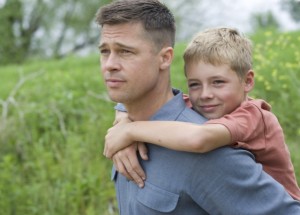Moneyball
Posted on September 22, 2011 at 6:02 pm
A-| Lowest Recommended Age: | Middle School |
| MPAA Rating: | Rated PG-13 for some strong language |
| Profanity: | Some strong language (much less than the book) |
| Alcohol/ Drugs: | Chewing tobacco, alcohol |
| Violence/ Scariness: | Tense family situations, sad references to injuries and letting players go |
| Diversity Issues: | Diverse characters |
| Date Released to Theaters: | September 23, 2011 |
| Date Released to DVD: | January 9, 2012 |
| Amazon.com ASIN: | B0060ZJ7BC |
Brad Pitt is underrated as an actor. But he is the best there is when it comes to calibrating the deployment of his onscreen star power, which he uses as expertly as Meryl Streep does accents. Pitt can dial it down to one when he wants to play character actor and make it work. But here he dials it back up to eleven, giving the role of Oakland A’s manager Billy Beane a shot of pure movie magic in this real-life story about the man who turned baseball upside down by using computer formulas to select “undervalued” players.
The Oakland A’s feel like “a farm team for the New York Yankees.” They make players great and then lose them to the teams with budgets more than three times as large. All that money makes the playing field anything but level. “We’re a small market team and you’re a small market GM. I’m asking you to be okay spending the money we have,” the owner tells Beane. “There are rich teams and there are poor teams and then 50 feet of crap, and then there’s us,” is Beane’s frank appraisal.
The A’s cultivate and train players who leave for the teams that can pay the most. A game that is supposed to be about skill and drive seems to be just about money. And then Beane, in the midst of a negotiation with another team that is not going well, notices a nerdy-looking guy in the corner who seems to have some influence. After the meeting, that nerdy guy becomes Beane’s first draft pick.
He is Peter Brand (Jonah Hill), a shy wonk who comes to work for Beane and together they pursue a different direction. Instead of the century-old system of watching players hit, catch, throw, and run and try to figure out if that means they will be able to perform in the big leagues — a system that failed badly when Beane himself was recruited right out of high school — they will look at computer algorithms about what produces wins. Brand and Beane develop a roster like Warren Buffett puts together a stock portfolio. They look at fundamentals to figure out unrecognized value. Sort of a grown-up Bad News Bears. Or, as Brand puts it, an Island of Misfit Toys.
The script from two of the best screenwriters in history, Aaron Sorkin (“The Social Network”) and Steven Zallain (“Schindler’s List”) is well-structured and filled with smart talk. The scenes of Beane’s own pro career are too long and too distracting. But scenes with Beane visiting his ex-wife (Robin Wright) and her new husband and especially those with Beane and his daughter add warmth and urgency to the story. But it is Pitt who is in every way the heart of the movie, his natural confidence and grace a lovely balance to the formulas with Greek letters and the endless statistics. It is nice to see baseball, that most number-centric game, get upended by numbers. And yet it succeeds because it is that most cherished of traditions, the come-from-behind underdog story.


